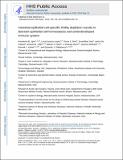Intestinal epithelial cell-specific RARα depletion results in aberrant epithelial cell homeostasis and underdeveloped immune system
Author(s)
Jijon, H B; Diaz, O E; Das, S; De Calisto, J; Pittet, M J; Mora, J R; Belkaid, Y; Xavier, R J; Villablanca, E J; Yaffe, Michael B; Suarez Lopez, Lucia; ... Show more Show less
Downloadnihms908752.pdf (2.697Mb)
OPEN_ACCESS_POLICY
Open Access Policy
Creative Commons Attribution-Noncommercial-Share Alike
Terms of use
Metadata
Show full item recordAbstract
Retinoic acid (RA), a dietary vitamin A metabolite, is crucial in maintaining intestinal homeostasis. RA acts on intestinal leukocytes to modulate their lineage commitment and function. Although the role of RA has been characterized in immune cells, whether intestinal epithelial cells (IECs) rely on RA signaling to exert their immune-regulatory function has not been examined. Here we demonstrate that lack of RA receptor α (RARα) signaling in IECs results in deregulated epithelial lineage specification, leading to increased numbers of goblet cells and Paneth cells. Mechanistically, lack of RARα resulted in increased KLF4 + goblet cell precursors in the distal bowel, whereas RA treatment inhibited klf4 expression and goblet cell differentiation in zebrafish. These changes in secretory cells are associated with increased Reg3g, reduced luminal bacterial detection, and an underdeveloped intestinal immune system, as evidenced by an almost complete absence of lymphoid follicles and gut resident mononuclear phagocytes. This underdeveloped intestinal immune system shows a decreased ability to clear infection with Citrobacter rodentium. Collectively, our findings indicate that epithelial cell-intrinsic RARα signaling is critical to the global development of the intestinal immune system.
Date issued
2017-11Department
Massachusetts Institute of Technology. Department of Biological Engineering; Massachusetts Institute of Technology. Department of Biology; Koch Institute for Integrative Cancer Research at MITJournal
Mucosal Immunology
Publisher
Nature Publishing Group
Citation
Jijon, H. B. et al. “Intestinal Epithelial Cell-Specific RARα Depletion Results in Aberrant Epithelial Cell Homeostasis and Underdeveloped Immune System.” Mucosal Immunology 11, 3 (November 2017): 703–715 © 2018 The Author(s)
Version: Author's final manuscript
ISSN
1933-0219
1935-3456